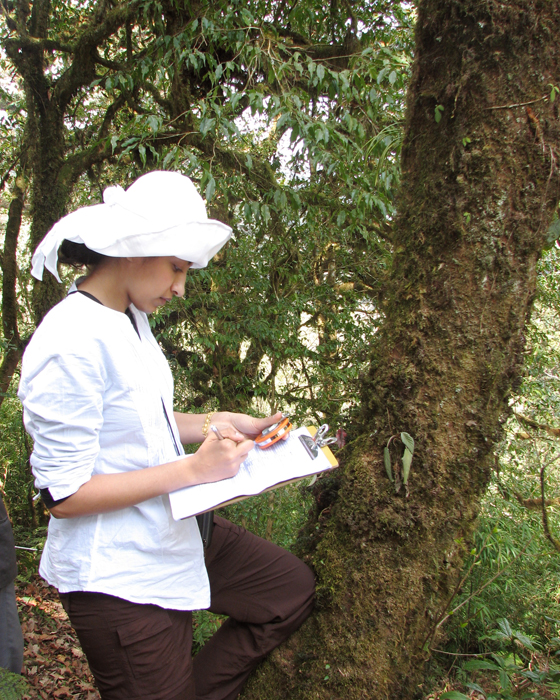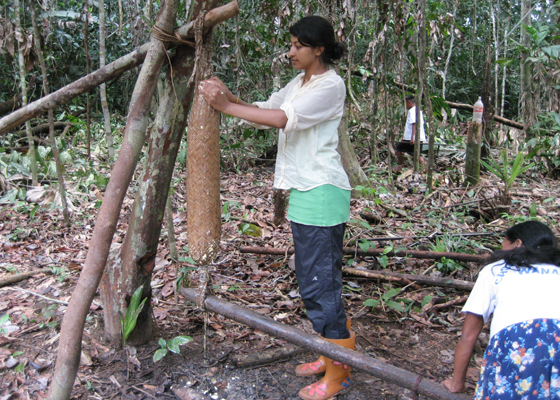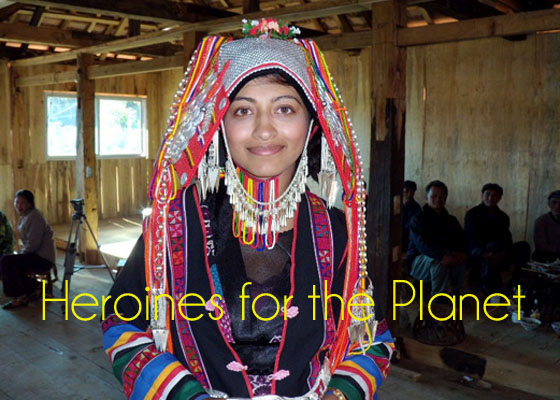
Heroines for the Planet: Tea Expert and Climate Change Scientist Selena Ahmed
I met Ethnobotanist Dr. Selena Ahmed at a tea and climate change event Eco-Chick attended in the fall of 2012. Selena eloquently spoke about her work and the book she co-authored with Michael Freeman: “Tea Horse Road: China’s Ancient Trade with Tibet.”
Selena is currently a NIH TEACRS Post-doctoral Fellow at Tufts University. During the 2012-2013 academic year, she was a visiting faculty member at Dartmouth College’s Environmental Studies Program and Northeastern University’s Department of Earth and Environmental Studies. This past year, Selena was also a Visiting Fellow at the Arnold Arboretum of Harvard University and a Foreign Expert at Minzu University of China. Starting this August, she’ll serve as an Assistant Professor of Sustainable Food Systems at Montana State University.
Selena’s work has taken her on a journey all over the world, and she finds her field research both inspiring and humbling.
It should come as no surprise that Selena agreed to do this interview from Yunnan, China where she is currently sampling the monsoon onset effects on tea. Her internet connection was at times spotty, but we were able to overcome tech obstacles to discuss her fascinating life and tremendous body of work.
Eco-Chick.com: You’ve traveled the world conducting research in forest-dwelling communities like the Venezuelan Amazon, Indian Himalaya, Belize, Dominican Republic, Anti-Atlas Mountains of Morocco and southwestern China. How have these travels changed you? And how have they inspired your work?
Selena: I am continuously inspired by the lives and landscapes that I encounter during my field research. These experiences on examining human interactions with the environment have broadened my perspective and made me revaluate what I think I know. My hands-on field research has highlighted to me the complexity of global environmental issues. Most valuably, I have been presented insightful lessons on sustainability.
Each field experience in someway takes me out of my comfort zone, grounds me, enables me to identify patterns, and energizes me to further explore. Travel has shaped my life since childhood. My parents raised my sisters and I to observe and learn from different cultural and environmental contexts and, to try to make connections – much like the ethnographic fieldwork I conduct now.
I am particularly inspired by the immense ecological knowledge of some of the individuals in the forest-dwelling communities that I work that links them to the natural world. I am fascinated by trying to understand the socio-economic and political factors that variably influence these links to the natural world and, what we can learn as a society towards a sustainable planet. The direction of my research is ultimately shaped by what I learn from the communities I work with and the changing dynamics of their lives and environment.

Eco-Chick: What drew you to focus on tea?
Selena: Tea is an intriguing lens by which to examine human-environmental interactions. Is global tea production ecologically sustainable? Can we identify alternative agro-ecosystem models for producing tea that is better for both human and environmental health compared to the dominating intensified model? These are the research questions that drew my interest on tea.
I came upon tea as a study system while searching for a topic for my doctoral research. I was looking to examine a globally and culturally relevant plant system that humans have an extensive history of managing in variable ways. I was also interested in studying a plant that has health benefits for humans. Of course the system needed to have some interesting research gaps that I could work to address and make a scholarly contribution towards.
The process of finding a doctoral research topic felt like identifying a “research soul mate.” I started looking for a study system in the Amazon because this landscape is so bioculturally diverse and awesome. One early autumn day in 2006 I was drinking a cup of tea with my doctoral advisor, Chuck Peters at the New York Botanical Garden. He described tea trees that he observed during his research in Burma that grow deep in the forest and soar up to 15 meters in height. The conversation shifted to the indigenous tea agro-forests of China’s Yunnan Province. I began to wonder whether tea agro-forests could provide an alternative model to the dominating intensified tea production model and for sustainable food systems in general.
Tea is the most widely consumed beverage in the world but there was this research gap on the multiple dimensions of biocultural diversity of tea agro-forests and, how management and global environmental change impact these systems. Research on tea has felt a perfect match. I feel incredibly privileged to have received a PhD studying tea in the motherland of the tea plant. The more I learn about this system, the more research questions arise.
Eco-Chick: Why do you find tea’s relationship with people and the earth so fascinating and complex?
Selena: I find tea’s relationship with people and the environment fascinating because it is so varied depending on context and is continuously in flux with multiple feedback loops. It is a neat a process of co-evolution. In addition, I find this relationship fascinating because it touches upon multiple issues that intellectually stimulate me – biodiversity, cultural diversity, health, livelihoods, ritual, natural resource management, plant domestication, agriculture, trade, taste…..
This dynamism makes it complex and often hard for me to make general statements on because it is extremely context specific – culturally, spatially and temporally. For example, one of the questions that I am asked the most regarding tea is, “What is the healthiest type of tea”? There are numerous variables involved in the production, storage and preparation of tea that muddle this response. Two samples purchased from the market of the exact same tea type can yield significantly different concentrations of antioxidant compounds – the prized health compounds many consumers seek in tea drinking. This may be because of the terroir of leaf sourcing, storage and preparation. We can make some generalizations on the basis of scientific evidence, but with some clauses.

Eco-Chick: How has climate change impacted tea production? What are associated farmer perceptions?
Selena: We are finding evidence that climate change is impacting the functional and sensory quality of tea. Tea plants and the antioxidant profiles of their leaves are impacted by climate variation including precipitation, temperature and solar radiation. Meteorological findings show that these climate variables have changed over the past fifty years in tea producing areas. The farmers that I am working with in southwestern China perceive that the climate has changed over their lifetimes and has impacted their tea. I am working with a team of collaborators at Tufts University, University of Florida and Minzu University of China to further elucidate patterns at a wider geographic scale. Our preliminary findings have notable implications for consumer health as well as for farmers whose livelihoods are linked to the quality of their crops. I am particularly focused on working to identify management practices and adaptations that enhance resilience to forecasted climate change.
Eco-Chick: Talk to us about your book “Tea Horse Road: China’s Ancient Trade with Tibet.” How did you weave in issues such as biodiversity, livelihoods, organic farming, globalization, health, and antioxidants into the book? What was the journey like co-authoring this book with Michael Freeman?
Selena: While doing research on tea in southwestern China, I came to learn of the integral role that the Tea Horse Road played in the ancient world, economically, politically and culturally. The Tea Horse Road is about lives and landscapes experienced through the production, exchange and consumption of tea. It is a journey along the world’s oldest tea trade routes from the birthplace of the tea plant in the montane forests of southwestern China to Tibet. Along the way, we explore the rich cultural practices and biological diversity of the communities the Tea Horse Road passes.
The Tea Horse Road tells the incredible story of human adaptation and of connecting cultures through the exchange of a botanical. It is a story about the upland tea farmers that cultivate tea plants. It is also a story of the caravan traders that traversed some of the world’s highest terrain to bring tea to their communities. Tea became a central component of the Tibetan diet for its stimulant properties and for providing the body with essential elements that maintain well-being. However, tea can not grow in the Tibetan territory because of the extreme altitudes and temperatures. Thus, tea has remained an imported item from tropical and sub-tropical areas in China’s Yunnan and Sichuan provinces. The adoption of tea by Tibetan communities can be viewed as a lifestyle adaptation to reduce the oxidative stress of high altitudes and, as a dietary supplement in an environment limited in fruit and vegetable production.
The Tibetan demand for tea fueled the creation of a network of trails extending more than 3,000 kilometres through forests and mountains that came to be known as the Cha Ma Dao, or Tea Horse Road. Tea was one side of the trade equation. The other was China’s demand for warhorses to protect its northern frontiers, thereby starting the two-way exchange of tea and horses.
Since the Tea Horse Road touches upon so many societal aspects, it was conducive to weave in many of the issues that are central to my research such as biodiversity, livelihoods, organic farming, globalization, health, and antioxidants. I worked on the writing for this book as I was wrapping up my doctoral dissertation. I wanted to present the themes of my doctoral dissertation to a general audience and the story of the Tea Horse Road lend itself well to an integration of these topics.
I found it extremely rewarding working with Michael Freeman to present the Tea Horse Road. Michael takes beautiful photographs that very effectively capture the spectacular journey that is the Tea Horse Road. The journey was fun, breathtaking and a huge learning experience for me. It was an honor to learn about book production from Michael. This is my first book and it was his one hundred and something!
Eco-Chick: Why are women underrepresented in STEM careers? How can we overcome this hurdle?
Selena: I think a huge aspect of why women are underrepresented in STEM careers is the way in which STEM disciplines are presented in the educational system. STEM disciplines may not always be accessible or attractive to women in the way in which they are presented. We can work to overcome this hurdle by providing children and young women with inspiring role models who they can identify with. I think we also need to provide more professional development to teachers and professors at all levels of education on how to make STEM more inclusive to women including curriculum content, the way this curriculum is presented, and assessment that takes into account multiple intelligencies. Professional development is also needed at the career level on providing more supportive working environments for women. More recruiting for women in STEM would likely be beneficial.
Eco-Chick: What’s the best piece of advice you’ve ever received?
Selena: One of the best pieces of advice I have received is to always live with passion – to truly listen to your heart and to act on this. A friend offered me this piece of advise in 2001 upon graduating from Barnard College with a BA in Economics and starting a financial analyst position. It was an unsought piece of advice and confusing at the time because I was happy with the track I had chosen.
Ultimately, it was this piece of advice that helped propel my career as a research scientist. I found myself conducting ethnobotany field research in the mountains of Morocco two years later, extremely stimulated by the work I was doing.
Living passionately is an essential aspect of taking care of yourself – and self care is a key component of sustainability. A healthy self is better positioned to take care of the community, the environment, the planet!
As a part of the Neutrogena Blogger Ambassador network, Neutrogena helped me to bring this interview to life. None of what is said in this article reflect the viewpoints of the Neutrogena Brand.





